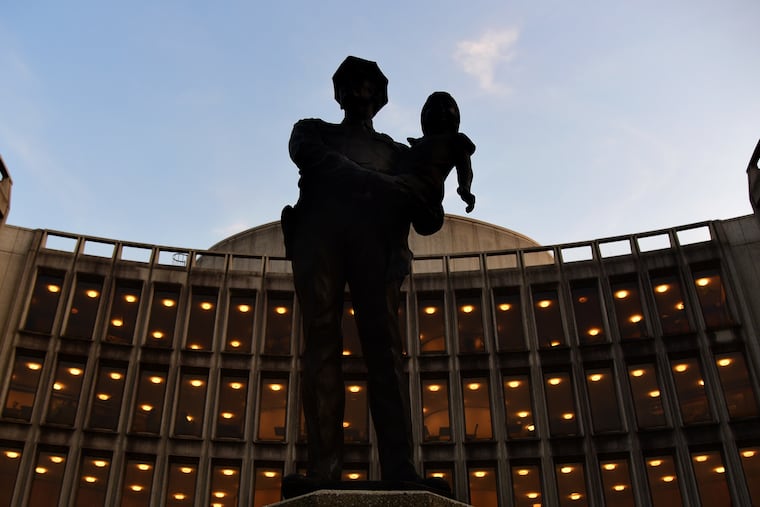Residents demand reforms at Philly’s first-ever hearing on police contract
Mayor Jim Kenney's administration is pushing for reform in a new police contract. But one official warned: “We will only be able to change so much at once."

Mayor Jim Kenney’s administration plans to push for reforms as it negotiates the city’s next police union contract, including requiring Philadelphia residency for officers, limiting back pay or reinstatement of fired officers, and giving the commissioner more power to order transfers.
But dozens of residents expressed frustration with the negotiation process and urged the city to implement more sweeping changes Wednesday during Philadelphia’s first-ever public hearing on a police contract proposal.
Residents shared stories of brutality or other negative experiences with police officers, and expressed anger over learning that fired officers are often reinstated through arbitration. Nearly 100 people testified at the hearing, which lasted about seven hours.
“I would even say that we need more than reform. In many ways we need to deconstruct central parts of what we believe to be public safety and build it back from the ground up,” said the Rev. Mark Tyler, pastor of Mother Bethel AME Church. “But until we get to that point, many of these efforts are extremely important.”
The hearing was the result of Council legislation introduced in June as thousands protested the police killing of George Floyd in Minneapolis. And it came just weeks after the fatal police shooting of Walter Wallace Jr. in West Philadelphia again caused thousands of residents to march in demonstrations and call for defunding the city’s Police Department.
Kenney has committed to pursuing police reforms and working to build trust between officers and Black and brown residents. But even as administration officials outlined their proposals for the new contract during Wednesday’s hearing, they cannot entirely control the outcome.
Under state law, both the city and the police union present their case to an independent arbitrator who issues a final and binding contract decision.
Deputy Mayor of Labor Rich Lazer said Wednesday he is optimistic the city can make a strong case for its proposals, but noted, “We will only be able to change so much at once.”
Councilmember Kendra Brooks expressed concern that the resulting agreement might not differ much from the last contract, negotiated in 2017.
“What are we taking from this moment, what are we taking from the cries of the people in the streets in this forthcoming contract negotiation, and what will be different in 2020 from what we saw in 2017?” Brooks asked.
Lazer said the administration had been primarily focused on reducing city pension costs in the last round of contract talks, which limited the ability to negotiate change in other areas. He assured Council that policing reforms are now the top priority.
But the administration will face pushback from the Philadelphia Fraternal Order of Police Lodge 5, the police union, which filed a lawsuit last month challenging Council’s right to hold hearings on contract proposals. Union president John McNesby accused City Council of “demonizing police officers.” The suit is pending in Philadelphia Common Pleas Court.
Some residents who testified criticized the FOP. Others said the new police oversight commission, which will be created after voters approved a ballot measure this month, could be empowered in the contract to play a role in internal investigations. They argued the Police Department should not be trusted to investigate itself.
“It is a step, but it is the bare minimum, and it is not enough,” Tamar Wilson, a member of the activist group Socialist Alternative, said of the hearing.
And several residents noted the importance of changing how police officers are disciplined. An Inquirer investigation last year found that in discipline cases from 2011 to 2019, the FOP successfully fought to have discipline overturned or reduced about 70% of the time.
Sergio Cea, a West Philadelphia resident, told lawmakers he was frustrated after two police officers shot a pizza delivery driver in his neighborhood in 2014 and were later returned to patrol.
“I went to those meetings where police shrugged their shoulders and told me the problem was the FOP contract,” Cea said. “We need a system of discipline with real consequences for police who behave badly.”
The city’s efforts to change disciplinary procedures are also limited by a state law known as Act 111. It requires disputes between government agencies and unions — for both contracts and disciplinary issues — to be resolved through binding arbitration.
State Rep. Donna Bullock (D., Phila.) told Council she is working with legislators in Harrisburg to change Act 111.
Kenney administration officials said they would propose that the contract forbid arbitrators from reducing punishments — making it impossible for fired officers to get their jobs back, for instance — if an arbitrator agrees they committed the misconduct at issue. (Under the current contract, arbitrators have say over the severity of the punishment even if they agree an officer is guilty.) The administration also wants to expand the pool of eligible arbitrators, and add more guidelines to govern arbitration.
Councilmember Katherine Gilmore Richardson, who sponsored the legislation that enabled the hearing, said she hoped it sheds light on a process that has long been kept secret.
“Now is the time to ensure the people we serve can tell us what they want to see,” she said.